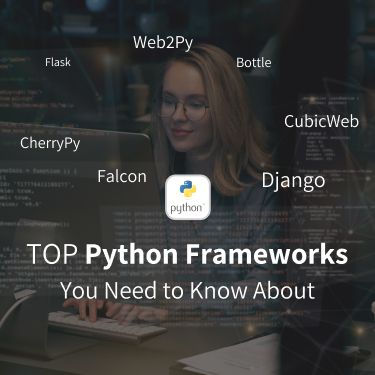Top Python Frameworks You Need to Know About
Python’s extensive range of frameworks has contributed significantly to its widespread popularity. These frameworks are predesigned modules that offer a standardized structure and an array of tools to aid developers in constructing applications. This article aims to introduce you to some of the most noteworthy Python frameworks that you ought to acquaint yourself with.
Python, a well-liked programming language, has garnered a global following of developers due to its apparent simplicity, user-friendliness, and adaptability. Python is always the most likely and fun language that is widely used by tech-savvy developers. When you enjoy building unique things and also enjoy learning new codes Python is the answer.
What are Frameworks in Python?
Python, being a versatile programming language, entails a plethora of pre-written code that developers can swiftly utilize to build applications that are not only efficient but also effective. Frameworks have become a necessity in software development as they offer a foundation to build on while reducing the amount of repetitive code that would otherwise be required, allowing developers to focus on writing specific application logic. The Python programming language has a vast array of frameworks available, each with its unique purposes, such as web development, data analysis, machine learning, and more. Some highly sought-after Python frameworks that come with a broad range of features and tools include Django, Flask, Pyramid, and CherryPy, each geared toward building complex applications with ease.
Why Use a Framework?
Python frameworks prove advantageous as they provide pre-written code and tools that expedite the process of building applications, thus making them more efficient. This allows developers to concentrate on writing specific code for their applications instead of having to start from scratch.
Python frameworks offer several benefits, including but not limited to:Accelerated development: By providing pre-built components, Python frameworks help in swiftly creating web applications without having to initiate from scratch, which in turn accelerates the entire development process.
Code reusability: The capability to reuse code across different projects via frameworks, curtails redundancy and saves a significant amount of time and effort.
Scalability: Various Python frameworks have been specifically designed to accommodate large-scale applications, making them a viable choice for businesses that anticipate an upsurge in their application usage.
Community support: The popularity of Python frameworks, such as Django and Flask, has fostered large communities of developers who are constantly contributing to the framework. This results in the provision of comprehensive support, bug fixes, and new features.
Top 5 Frameworks In Python
Django
Django stands as a prominent and widely used web framework, available as an open-source package for creating Python-based web applications. This framework adheres to the Model-View-Controller (MVC) architectural style and prioritizes the ability to reuse code across various projects. Boasting an inclusive set of features such as pre-built support for administrative interfaces, authentication, security, and database modeling, the platform makes it possible to develop intricate web applications with relative ease. Django employs an object-relational mapper or ORM, to effectuate the translation of objects into database tables. This enables the use of an object-oriented approach to manage data retrieved from a database. The principal databases supported by Django encompass Oracle, MySQL, PostgreSQL, and SQLite, with supplementary databases available via third-party drivers. Enumerated below are additional notable features intrinsic to the Django web framework:
- URL routing
- Authentication
- Template engine
- Database schema migrations
- A plethora of ready-to-use libraries
- More secure as compared to other frameworks
Flask
Flask, a pliable and lightweight Python web framework, is utilized for the construction of web applications. Its functionality encompasses the provision of tools and libraries for common web development tasks, which include routing, handling requests, and rendering templates. Flask’s modular architecture and simplicity are key features that provide developers with customizability and extensibility by incorporating third-party plugins and libraries. For small to medium-sized web applications, Flask is an ideal choice owing to its flexibility and lightness. Flask has found extensive applications in the development of web services, web applications, and APIs. Its documentation is laudable and its community is actively supportive.
CherryPy
CherryPy stands as an exemplar of a svelte Python web framework, enabling software engineers to develop web applications with minimal exertion. This framework proffers inherent sustenance for HTTP/1.1, SSL, and WSGI, alongside a flexible plugin system and robust configuration mechanism. CherryPy’s simplicity and flexibility herald it as an exemplary choice for expeditiously and effectively constructing modestly-sized web applications. Furthermore, it boasts an ardent community and extensive documentation, rendering it facile to commence and rectify any complications that may ensue.
Bottle
Bottle is a minimalist web framework for Python that is lightweight, easy to learn, and has a small footprint. It is designed for building small to medium-sized web applications with less overhead and fewer dependencies. One unique feature of Bottle is its built-in template engine called SimpleTemplate. It allows you to easily create and render templates with minimal code.
Web2Py
Web2Py is an open-source full-stack web framework designed for Python that emphasizes speedy development, security, and scalability. Notably, the framework comes with an integrated development environment that is web-based and supports multiple databases, including Oracle, PostgreSQL, MySQL, and SQLite. One unique feature of Web2Py is its ability to generate and update database tables without the need for manual intervention from developers. By relying on application models, Web2Py can automatically create or update database tables to match any changes made to a model. This functionality not only saves time but also reduces the likelihood of database schema errors.
FAQ
Which Python framework should I choose?
Well, the choice of a framework depends on project requirements, complexity, and personal preference. Django is frequently suggested for larger applications with complex functionality, while Flask is excellent for smaller projects and developers who seek more flexibility. Take into account elements like documentation, learning curve, community support, and the particular features and capabilities that require.
Can I use Python frameworks for purposes other than web development?
A: While Python frameworks are commonly used for web development, some frameworks like Django and Flask can also be used for other purposes. They can be employed to build APIs, microservices, backend systems, and even desktop applications.
Are Python frameworks free to use?
A: Yes, most Python frameworks are open-source and free to use. You can download and use them without any cost. Additionally, they often have active communities that provide support and continuously improve the frameworks.Remember to research and explore the documentation of specific frameworks to find the one that best suits the project requirements.


